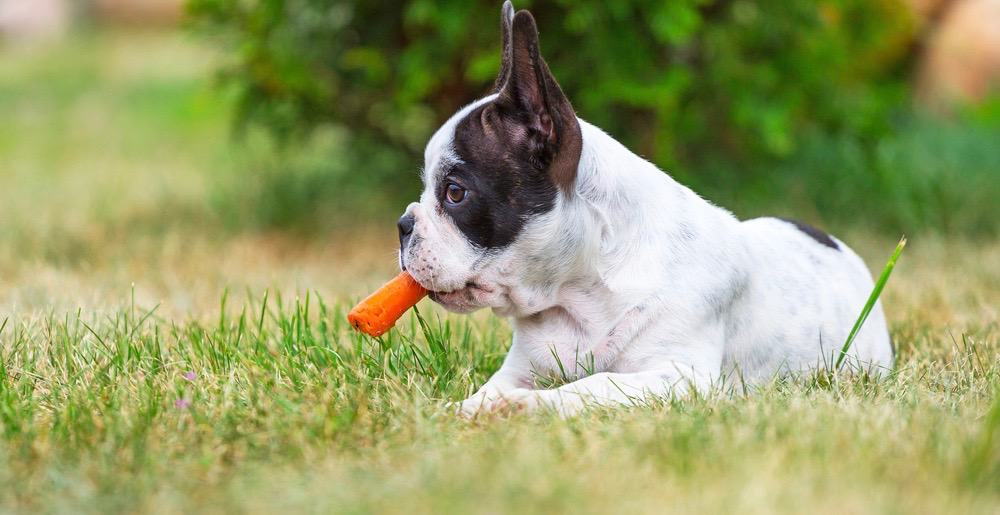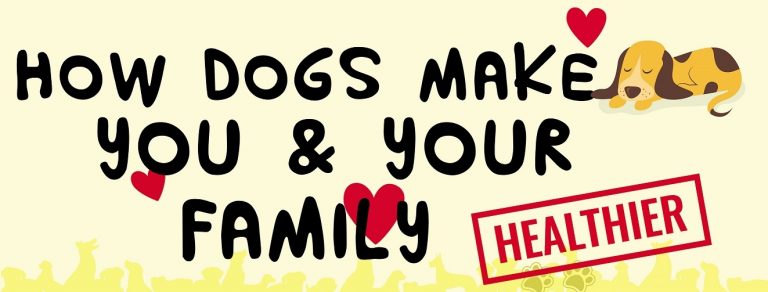French Bulldog Growth Chart – Frenchie Weight & Size Chart
With companion dog breeds gaining popularity over working dog breeds, the cute French Bulldog has become one of the most popular pets in the United States.
This breed is prone to weight gain, so a French Bulldog growth chart can help you to determine whether you’re doing what’s best for your fur friend’s health.
There’s a difference between puppy fat and fat puppy, and although even the latter are awfully cute, being overweight poses a health risk you can’t ignore.
Use our French Bulldog weight chart to follow the growth and development of your new friend and family member all the way to a healthy, happy adulthood.
When do French Bulldogs stop growing? Find the answer to this question and other French Bulldog FAQs in the article below.
When Do French Bulldogs Stop Growing?
Some dog breeds continue growing until they are nearly two years old, but French Bulldogs are usually as big as they’re going to get by the age of 12 months.

There are even dogs who have reached adult size by the age of just nine months! Muscle development continues until the age of about two years, so even once your dog is as tall as it is going to get, it will still gain weight in the form of muscle mass.
Because French Bulldogs are so variable, it’s hard to predict just how big your Frenchie will be.
It will take after its parents, but you can also do a rough estimate by using the weight of your puppy at the age of four months and then doubling that figure.
French Bulldog Weight Chart
Use our French Bulldog weight chart as a guideline to track your puppy’s development. You will notice that there is quite a broad weight range listed on our chart.
Use the lighter weights for smaller Frenchies and females and the heavier weights for males and bigger pups.
However, do note that we are basing our weight chart on breed standards and there are variations that fall outside this standard.
If, for example, you have a “mini” or “teacup” French Bulldog, its weight will fall outside the breed standard. In this case, look at the proportional weight compared to our chart and use this information to adjust it accordingly.
Because Frenchies are little dogs, they’re quite easy to weigh at home. If you have difficulty getting your dog to stand on a bathroom scale, simply weigh yourself, pick up your pup, and weigh yourself (plus pup) again.
Wondering how tall your puppy is? Dogs’ height is measured at the withers (shoulder) and you can easily estimate your puppy’s weight if he or she is happy to stand beside you and be petted.
Use your leg or arm as a measuring tool and then measure it off using a measuring tape. Of course, if you can trust your puppy not to see the measuring tape as a new toy, you can use it directly.
French Bulldog Puppy Weight Chart
| Age | Average lb | Average kg |
|---|---|---|
| 1 Week | 1.2 - 2.2 lbs | 0.5 - 1.0 kg |
| 4 Weeks | 2.0 - 4.2 lbs | 1.0 - 2.0 kg |
| 8 Weeks | 5.0 - 6.9 lbs | 2.2 - 3.1 kg |
| 3 Months | 6.9 - 9.0 lbs | 3.1 - 4.1 kb |
| 4 Months | 9.0 - 12 lbs | 4.1 - 5.4 kg |
| 4.5 Months | 12 - 15 lbs | 5.4 - 6.8 kg |
| 5.5 Months | 15 - 16 lbs | 5.4 - 7.3 kg |
| 6.5 Months | 16 - 18 lbs | 7.3 - 8.2 kg |
| Full Grown | 23 - 28 lbs | 10.4 - 12.7 kg |
French Bulldog Growth Chart – 7 Stages Of French Bulldog Development
Birth – 3 Weeks
Like all puppies, French Bulldogs are born blind. They also can’t hear. For the first two weeks or so, they are only interested in feeding and sleeping and they aren’t ready to interact with the outside world.
Sometime in the second to the third week of their lives, their eyes and ears are sufficiently developed to start receiving information from the outside world.
If you’ve reserved a puppy while it is still this young, you can ask the breeder to leave an item that you have worn near your puppy.
It will help him to feel more at home with you when it is time to leave his mom and move in with you.
3 Weeks – 4 Weeks
Your puppy becomes more active now, but he is still very focused on his mom and siblings. Despite this, the pup begins to recognize individual humans, but unless he was born in your home, he is not yet ready to interact much with you.

A puppy of this age is instinctively aware of his vulnerability, so it is wise to avoid situations that he may find alarming – including introductions to outsiders, new environments or activities, and loud noise.
4 Weeks – 7 Weeks
This is a busy time for French Bulldog puppies and one of the most important times for the formation of their personalities. Puppies begin to play and learn more about the things around now.
They will learn a lot from their mothers who will discipline them gently but firmly and teach them basic doggie manners. Leave this job to her. Puppies are only ready to learn from people later on.
At around 4 weeks, the pups are ready to start eating solid food although they will still drink from their mother. She will be in charge of the weaning process, so the human obligation is only to make solids available.
Because this time is so important in a puppy’s development, it needs to be with its “dog family,” and shouldn’t go to a new home until after the seven-week mark.
2 Months – 3 Months
At this age, French Bulldog puppies are still babies, but they are ready to begin learning obedience basics. Training should never be harsh, and particularly not when puppies are this small.
A particular quirk of Frenchies is that they are inclined to be very nervous during this life phase, so be gentle and patient.
At the same time, people have an important role now. Enjoy time with your puppies and teach them a few basics like how to walk on a leash.
Puppies will enjoy meeting new people in non-threatening situations now, but don’t force interactions.
3 Months – 4 Months

Your puppy is no longer a baby, but it is still a long way from being full-grown. French bulldog pups are inclined to be mouthy,and now is the time to teach it not to bite or chew people.
A sharp verbal reprimand followed by a few minutes of ignoring the puppy is enough to get the message across.
Like human children, French bulldog puppies may try to assert their independence by being disobedient.
Again, reinforcing commands is the answer, but you should limit this to verbal reprimands and make sure you give a lot of positive reinforcement when your puppy is being well-behaved.
4 Months – 6 Months
Your French Bulldog puppy is still “just a kid” but you also don’t want him to learn bad behaviors. Keep up the firm, gentle training and be sure that everyone in the family is sending the same messages.
Milk teeth will begin to switch to adult teeth, so your puppy will want to chew anything and everything! Provide chewy toys and don’t be surprised if you see the occasional tooth come out after a busy chewing session.
At about six months old, it’s time for spaying or neutering. This is good for your dog’s health and may even extend his or her lifespan.
It also helps to prevent instinctive behaviors like following the scent of a female on heat from becoming a perpetual problem later on.
6 months – 18 months
Compare this stage to the late teens. Your French bulldog is young, active, and adventurous, but he or she is not yet an adult and needs your supervision.

Learning continues at a rapid rate. And your input will help to ensure that your young Frenchie learns the right things – or the wrong ones!
Do provide opportunities for socializing with other people and other dogs. Puppy classes are a great place for this, and at this age, you can go beyond the very basic commands.
How Big Do French Bulldogs Get?
French Bulldogs are not the biggest dog breed out there, but you still might be wondering how big do French Bulldogs get.
The first thing to check is a French Bulldog Growth chart, where you can compare his current size and follow his growth curve to get a good estimate.
If you know your dog’s parents, you can look at them to get an idea of his genetics. A DNA test could be able to tell you the same thing.
Sometimes you can even look at your dog’s paws and see how much more he has to grow to fit those paws and then you can get an idea of his final size.
How To Help Your French Bulldog Lose Weight If He Is Overweight
Unfortunately, French Bulldogs do have a tendency to pack on extra pounds. If your vet has suggested that your pup lose some weight, she will have also likely given you some suggestions, but we have some as well, including:
- Increase his exercise: How many walks are you giving your dog a day? Dogs, just like humans, need regular exercise to stay healthy.
- Watch his diet: Are you feeding your dog the right food or even the right amount of food? If you are feeding your dog food that is full of fillers or more than he needs a day, it’s time to make a switch.
- Stop giving him human foods: A big cause of obesity in dogs is feeding dogs unhealthy human foods right off of the plate. Your dog doesn’t need that. Some human foods are good for your dog in moderation, but not prepared meals off of your plate.
What Is A French Bulldog’s Neck Size?
Knowing your dog’s neck size is important so you can know what size of collar your dog can wear. Too big and your dog can slip out of it. Too small and your dog can choke.
The average French Bulldog neck size is between 12 and 16 inches, but you need to know for sure.
To measure your French Bulldog’s neck, use a tape measure and wrap it around the area of your dog’s neck that will wear the collar.
This is usually between the chin and the shoulders. Once you have the circumference, you can compare it to the sizes of collars.
When To Neuter Your French Bulldog
While the science of neutering large breed dogs is under debate, it is not the same for French bulldogs. If you have any concerns about this, it would be best to ask your vet about her recommendations.
The dogs are recommended to be neutered between the ages of 4 and 9 months. The goal of this is to catch them in adolescence before they have completely matured.
Neutering is said to help their disposition and avoid them developing an aggressive streak that some bulldogs are prone to.
They will still maintain their natural inclination to guard you and your property, but it won’t be as aggressive as it might have been. There is always a risk that your pup will not have a change in behavior, of course.
Neutering your French bulldog will also increase his lifespan while still reducing unwanted pregnancies. Though, as French bulldogs have trouble conceiving on their own, it might not be an actual concern that you have.
Dangers Of Stunted Or Accelerated Growth
When you are comparing your puppy to a French Bulldog size chart, you might be concerned that there is a deviation from the growth chart with your puppy.
In general, as long as your puppy stays on the same growth curve, meaning he is growing at a consistent speed, there isn’t anything to worry about.
Stunted growth is rare and usually caused by malnutrition or illness. This can result in trouble growing. Acceleration growth, meanwhile, happens when a puppy is fed too much food.
They will not grow any faster bone-wise. But their weight can increase too quickly, putting strain on their bones.
Factors That Affect French Bulldog Puppy Growth
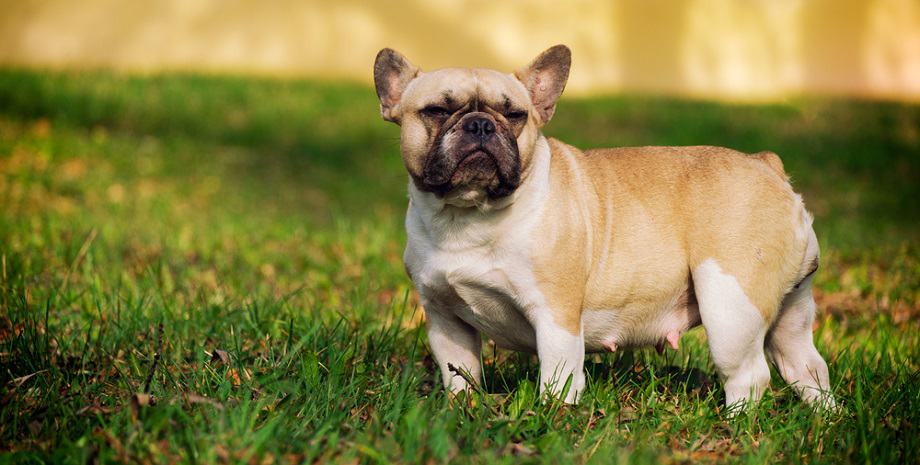
Genetics
As we’ve already pointed out, genetics are very variable in French Bulldogs. If you’ve opted for one of the miniature variants, that will be in his genes. After all, mini Frenchies are bred using the smallest French Bulldogs.
Since you have likely bought a pedigreed dog (how else can you know it’s a Frenchie?) you should be able to get a look at mom and dad dog.
The average puppy in the litter should take after them, but the biggest pup will likely grow to be the largest dog of the family while the “runt” may even be smaller than his or her parents.
Nutrition
You may have read that European children born during the 2nd World War grew to a smaller stature than we do today. That’s because there was a shortage of nutritious food.
The same kind of thing is true for dogs, plants, and anything else that lives. Although it may have the genetic potential to reach a certain size, that potential will not be reached if the diet is poor.
At the same time, you don’t want your pup to be overweight, so choose high-quality puppy food and watch his or her condition.
Physical Activity & Health
Physical activity builds muscle, and although they are small, French Bulldogs are muscular little dogs. Once they are ready to run and play, they should be encouraged to do so. Healthy muscle mass forms part of the French Bulldog package.
Poor health is a stress factor that will limit development, so start off by ensuring that your dog is vaccinated and gets his booster shots in good time.
Internal and external parasites are a threat that you need only be alert to combat successfully. Your vet will advise you on the best products currently available and how often to use them.
French Bulldog Genetics And Common Health Problems
Ethical breeders will do their best to ensure that puppies have good genes. Unfortunately, there are some very bad genes to avoid in French Bulldogs, and the complaints that spring from them are sometimes very serious.
Always ask breeders whether they have screened the parents for genetic faults. Even with proper screening, there is a chance that they will occur, but a far lower one than when breeders have not taken the necessary precautions.
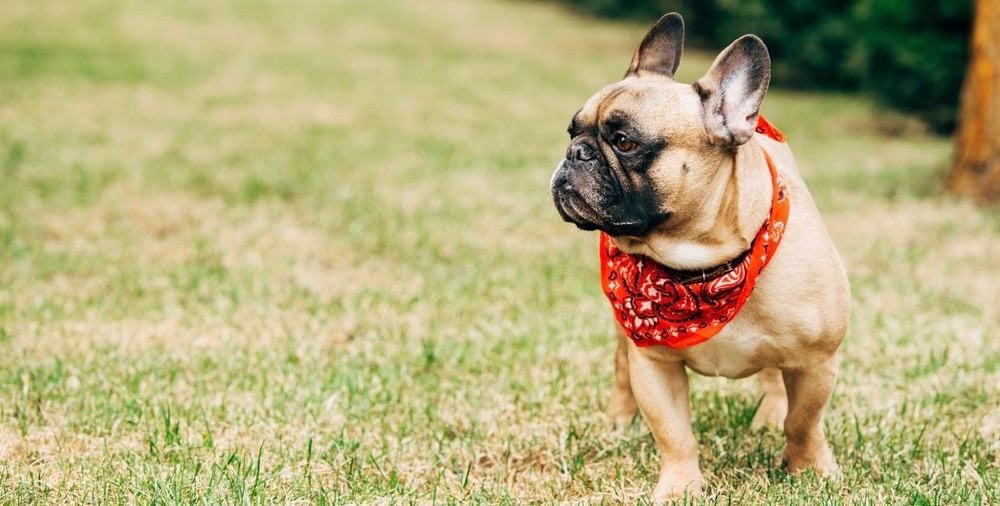
Common illnesses in French Bulldogs include:
Hip Dysplasia: This is a genetic condition that results in poorly fitting hip joints. Dogs that have it may not show any symptoms, or they can become lame. In old age, a dog with hip dysplasia will be more prone to arthritis.
Other bone problems: Knee and back problems sometimes occur in French Bulldogs and they may develop a rupture in one of the spinal discs. If your dog is in pain, do not treat him with medicine intended for humans. Take him directly to a veterinarian.
Brachycephalic Syndrome: A French Bulldog who snuffles a lot may have this syndrome. His breathing is obstructed by narrow nostrils and an elongated soft palate combined with a short head obstructs breathing still further.
The condition is not always severe, but it can be a cause of death. In severe cases, veterinarians will consider surgery to correct the problem.
Allergies: Like humans, French Bulldogs can suffer from allergic reactions. They could come from contact with a certain substance, come from the air they breathe, or from the food they eat. Treatment depends on the type of allergy.
Von Willebrand’s Disease: This illness means that blood cannot clot properly to heal injuries. Your dog will be prone to bleeding, but if the disease is properly managed, your dog can still enjoy a long life.
Get veterinary help if your dog is prone to bleeding of the nose or gums or if you see blood in his stool.
What If My French Bulldog Is Not The Right Weight
Frenchies aren’t very active dogs, and they love to eat, so it’s far more likely that your French Bulldog will be overweight than underweight.
If you’re worried that your French Bulldog weighs too little, a visual inspection should be all you need to check its condition. Simply put, you should never be able to see protruding ribs!
Determining whether your dog is overweight can be a bit trickier. We all love our dogs and think they are absolutely beautiful. And we’re quite likely to take umbrage if anyone refers to our beloved pets as being “obese.”
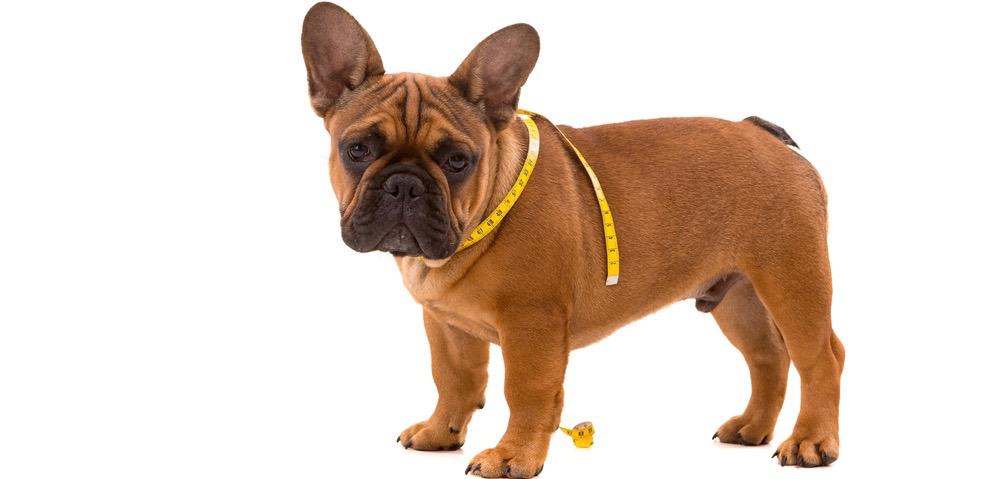
Realistically, however, this is a matter of your French Bulldog’s health and not just one of sentiment or personal pride in your ability to be a good dog owner. So let’s get real with a few simple checks to see if your Frenchie is overweight.
Your dog should have a waist. You should definitely be able to see your dog’s waistline. If your dog looks more like a sausage than an hourglass, you may need to use the “o” word we referred to above.
There should be a clear muscle definition. There’s nothing more beautiful than being able to see your French Bulldog’s musculature beneath the skin. If you can’t, there’s a layer of flab, and you and your dog will need to work to get it off.
Your dog struggles to scratch his ears: It should be an easy matter for your dog to scratch those itchy ears. If he struggles to get paw to ear, he’s overweight and possibly even obese.
Overweight or underweight French Bulldogs – a health note. It’s wise to take an overweight dog for a veterinary checkup – especially if you don’t think you have been feeding your Frenchie too much.
Thyroid conditions can cause otherwise healthy dogs to gain weight heavily, and they may need medication.
An overly skinny dog could also have his share of health issues, so once again, you should have a word with your veterinarian if you’re sure you’ve been feeding correctly but your dog seems too thin.
How Long Are French Bulldogs Pregnant?
French Bulldog pregnancy is typical of that of most dogs. They will be pregnant for between 58 and 68 days with an average gestation period of 63 days before the puppies make their appearance.
Once you know she is pregnant, do take your French Bulldog to a veterinarian for a general health check.
Unfortunately, most French Bulldog puppies must be delivered by cesarean section. Statistics cite 80 percent of French Bulldog pups having to be delivered this way.

So, before you breed with your female, do consider the implications and be ready for a hefty vet bill if you plan to go ahead.
How Many Puppies Do French Bulldogs Have?
French Bulldogs have very small litters of pups. Most will only deliver three puppies at a time, five puppies is unusual, and rare cases in which there were seven pups in a litter have been recorded.
Generally speaking, three is the most common litter size and your veterinarian can confirm the expected litter size during your dog’s pregnancy.
We cannot stress the need for veterinary supervision sufficiently when it comes to breeding these dogs. If you think “nature’s way” is better, please remember that dog breeds are artificially created through selective breeding and that nature’s way is sometimes very cruel indeed!
What Is The Life Expectancy Of The French Bulldog?
A well-bred French Bulldog will be more inclined to fulfill its life expectancy of 10 to 14 years. That’s fairly average for a dog breed of its size and weight and gives you plenty of time to enjoy your canine’s companionship.
The most common cause of death, as with so many dog breeds, is cancer.
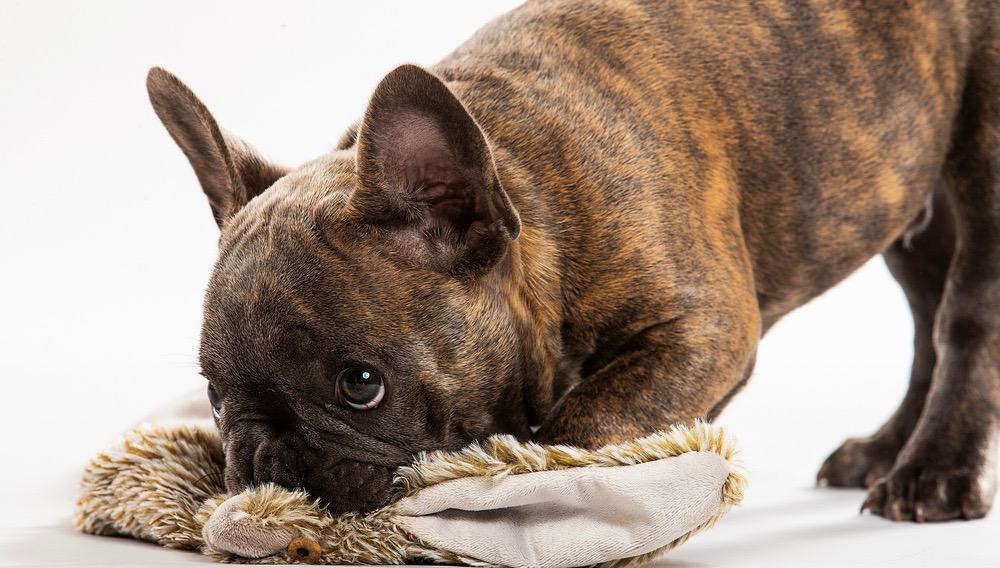
To maximize your time together, take good care of your French Bulldog’s health. That means choosing very high-quality pet food, feeding in the right amounts, and providing exercise.
Frenchies are quite happy to laze around the house, but their health needs mean that you should get them moving. Luckily, even these laid-back doggies love their walks.
Regular veterinary checkups (at least once a year) are necessary and spaying or neutering could mean a longer, happier life for your dog.
How Much Does It Cost To Own A French Bulldog?
The price of French Bulldog puppies is commonly advertised at between $2500 and $4000 dollars – but they can be even more costly than that.
You may see “Frenchies” being advertised for less, but chances are, they aren’t the real thing or they were bred from parents who have genetic health defects. You should be very suspicious of low prices on these pups.
As we’ve seen, just getting them into the world often requires surgery. To top that, Frenchies aren’t always the best of moms and that may mean a lot of extra care and attention from the breeder just to ensure that the pups survive. The bottom line? These pups don’t come cheap.
Owning a French Bulldog isn’t a cheap business either. Even if you’re already in the habit of giving your dogs the best quality pet food you can afford, you may still find that veterinary bills are higher for Frenchies, especially if they suffer from one of the health issues common to the breed.
Just as puppies don’t come cheap, keeping a French Bulldog can be rather more costly than keeping dogs of other breeds.
Despite all this, the charming personality and cute appearance of French Bulldogs make them popular pets.




